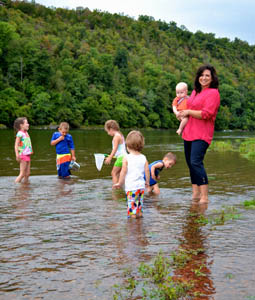
Surround yourself with supportive family and friends.
The true ones will be there for you more than you could ever imagine.
Next spring, Teresa and Hal Wehmeyer will watch their miracle son, Howie, graduate from high school—the son they were told they could never have because of Teresa’s cancer treatments.
On October 16, 1991, Teresa learned she had breast cancer. She was only 30 and the mother of three young girls, Andrea, 6, Nicole, 3, and Leah, just 18 months. Though this news would be devastating to anyone, it was even more so for Teresa. Her mother had died from the same disease.
The first of six children born to Martha and Frank Esposito, Teresa’s childhood was abruptly changed at 13 when her father left. She did not return to school after eighth grade so that she could stay home to take care of her five siblings while her mother went to work. She managed to homeschool herself and earn her high school diploma with the rest of her class.
Teresa credits her mother for instilling in her a glass-half-full attitude toward life.
“My mother always told me to ‘have no hate, no bitterness, for it will ruin your life,’” Teresa says. “She told me to trust in God.”
That attitude did not change when in 1981, at 41, Martha was diagnosed with stage four breast cancer that had metastasized to her bones. She survived for five years, much to her doctor’s surprise. During those years, Teresa’s family relied on their Catholic faith and the tight-knit group of seven families that relocated with them from San Diego to Mountain Home in 1972.
“They brought food, did the shopping, or even paid the rent if needed,” Teresa says.
At the time, Teresa was too young to fully appreciate the enormous generosity of these friends, but she now understands the value of friendship and support of community.
Just shy of five years after her mother died, Teresa found a lump in her breast during her regular self-examination, a lump that didn’t show on her mammogram three months earlier. It’s easy to understand how this would seem like nothing other than a death sentence to Teresa and her family. There was one major difference, though: Teresa’s cancer was caught much earlier than her mother’s.
“Dr. Stahl told Hal and me that we wouldn’t know if the cancer had spread to the lymph nodes until the pathology was back the next day,” Teresa says.
That was a Thursday, and Dr. Stahl was due to be out of town until Monday, a delay they found difficult.
“Hal insisted that Dr. Stahl share some insight with us about how the lymph nodes looked,” Teresa says. “He said a couple of them looked questionable, but stressed he really didn’t know. We were resigned to getting results on Monday, but Friday morning, as we were leaving the hospital feeling very worried and anxious about the results, the elevator doors opened and there stood Dr. Stahl shouting, ‘It’s negative! The results are negative!’ I jumped into his arms crying hysterically as Hal fell to his knees sobbing in thanksgiving. My angel, Dr. Stahl, said he couldn’t go on his trip until he delivered the news. To this day, whenever I see him, I hear angels sing. I really do.”
Following her lumpectomy, Teresa began the miserable treatments—six months of chemo and eight weeks of radiation. The hardest part was hiding from her little girls how horrible she felt. Teresa was determined that they not fear losing their mother. Hal helped her feed and bathe them, dress them for school, and tuck them into bed.
“When the girls were sleeping, he would hold me on the couch, the vomit bucket near by, and tell me how beautiful I was and how much he loved me,” Teresa remembers. “It meant so much to me because I felt so ugly with my loss of hair, pasty skin, and black circles under my eyes. He loved me through all of that.”
Her husband’s strength and devotion still amaze her.
Hal loves his daughters with all his heart, of course, but since he was a young boy, he had dreamed of being a father to a son and had collected things he would share with the boy.
“I desperately wanted to give Hal that son, and I spent many nights on my knees praying for one,” Teresa says.
Not only did she survive the treatments and return to good health, five years later she did, miraculously, give birth to their son, Howie.
Today, almost 24 years later, Teresa is a survivor, surrounded by her four children and six grandchildren. The family regularly enjoys dinners together, outings on the pontoon boat, floating the river, fishing, playing in the park, and TV time with popcorn. Teresa also has a career she loves and a large circle of lifelong friends, including three generations of the families that moved here together from California.
“Cancer doesn’t have to be a death sentence,” Teresa says, “but instead a wake-up call to really appreciate life and be thankful for everything in it!” M! October/November 2014
Everyone’s lives and experiences are different, but Teresa’s greatest hope is that sharing her story and the following suggestions may be helpful to women faced with a breast cancer diagnosis (or other life threatening situations):
• Trust in your faith.
• Focus on what’s positive in your life.
• Never give up on your dreams. Believe in them.
• Surround yourself with supportive family and friends. The true ones will be there for you more than you could ever imagine.
• Choose your own way to deal with it.

Leave a Reply